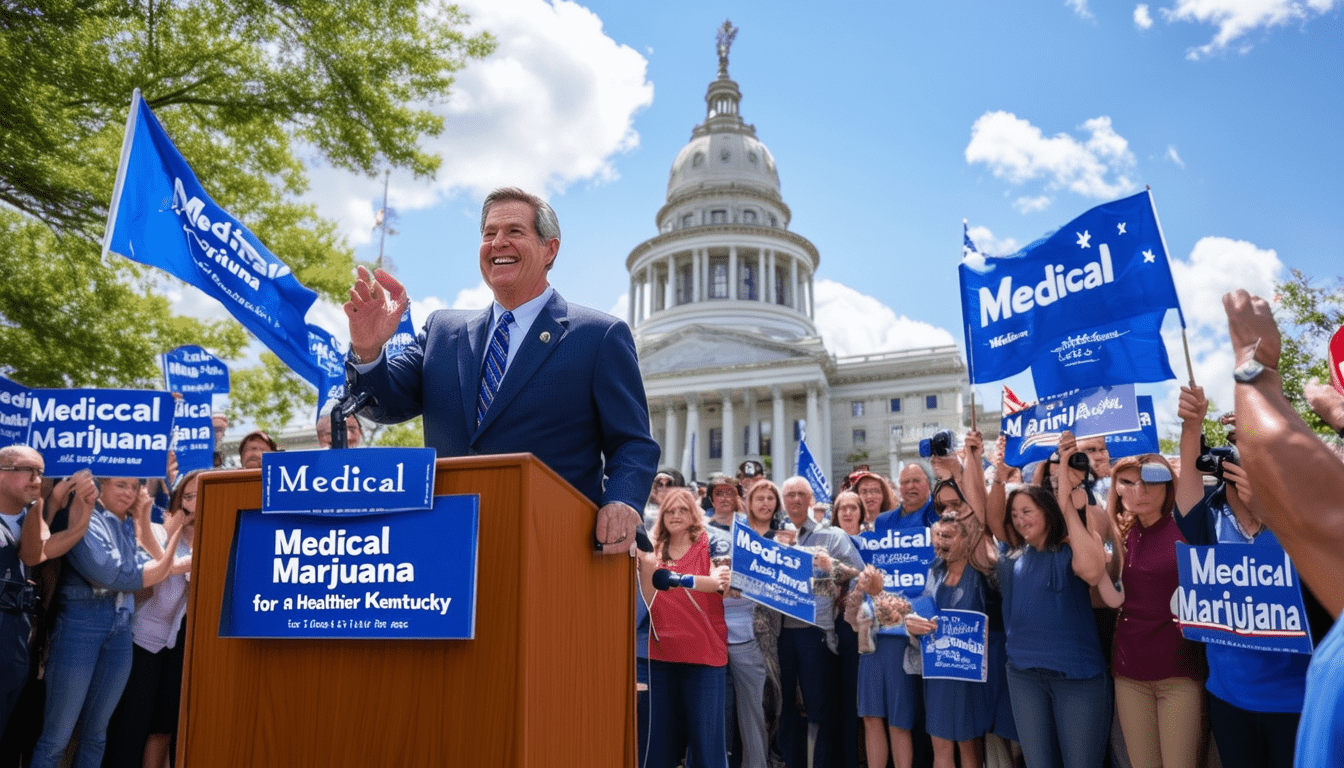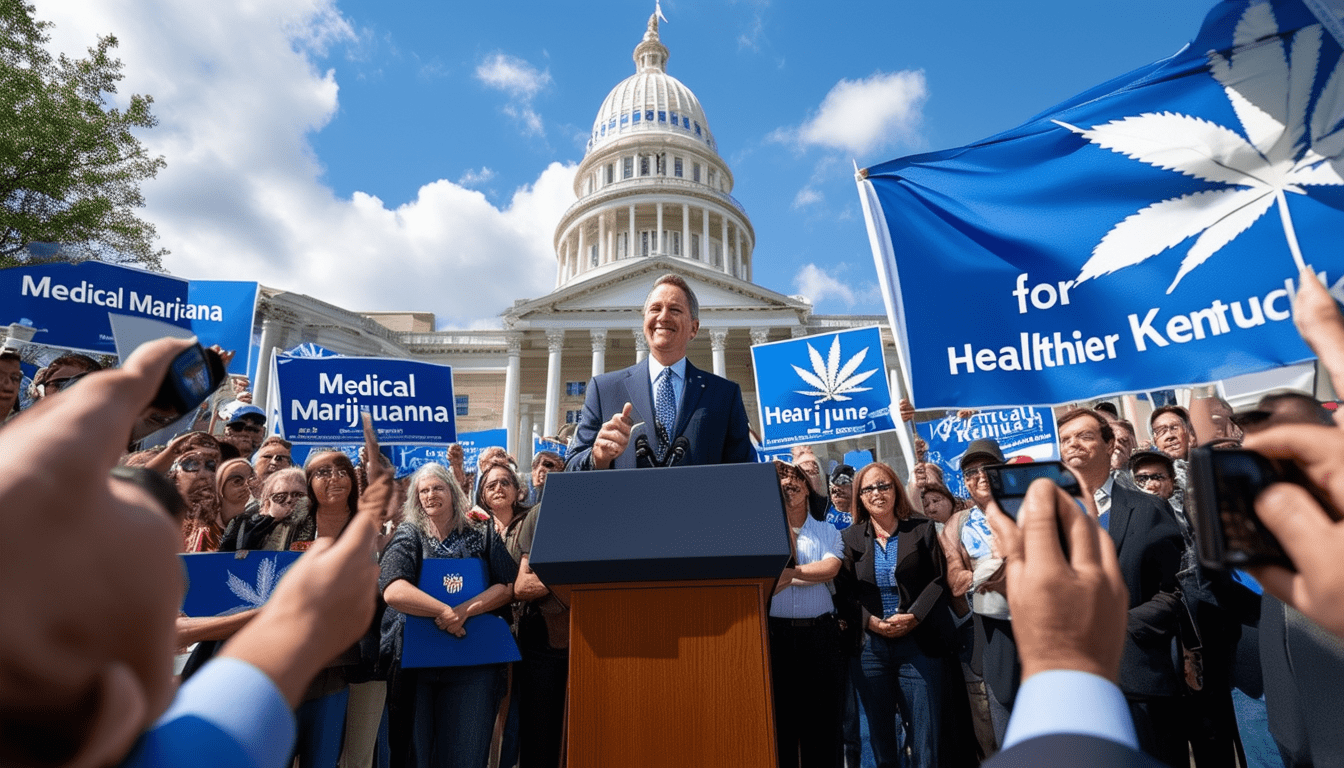Kentucky Governor Highlights Strong Public Endorsement for Medical Marijuana Following Major Local Election Wins
|
IN BRIEF
|
The recent local elections in Kentucky have revealed a remarkable shift in public sentiment towards medical marijuana, showcasing a strong endorsement from voters across the state. With over 100 cities and counties approving ordinances to permit medical cannabis businesses, the support for cannabis reform has become undeniable. Governor Andy Beshear has emphasized that this overwhelming backing confirms that the debate around medical cannabis is no longer uncertain; rather, it is clear that the people of Kentucky are ready for enhanced access to medical marijuana for those in need. This pivotal moment reflects a growing consensus that transcends political and geographical boundaries, positioning Kentucky on the path to a significant transformation in its healthcare policy landscape.

Recent elections in Kentucky have garnered overwhelming support for medical marijuana, with more than 100 local jurisdictions approving measures to allow cannabis businesses to operate. Governor Andy Beshear has heralded these results as a definitive sign of public opinion shifting toward acceptance of medical cannabis, reflecting a robust desire for safe and accessible treatment options for patients with serious medical conditions.
A Clear Verdict from Voters
During a series of local elections, voters in 53 cities and counties convincingly approved measures that would facilitate the establishment of medical cannabis businesses. Governor Beshear emphasized that this outcome signals that “the jury is no longer out” on the issue of cannabis reform, asserting that the sentiments of Kentuckians are firmly in favor of providing safe access to medicinal treatments.
Election Day Results and Voter Sentiment
Although advocates for cannabis reform experienced setbacks in other states on Election Day, Kentucky’s results stood out as a resounding success. Voter turnout in these jurisdictions reached over 340,000, with every single referendum regarding medical cannabis passing. This reflects a clear consensus among constituents, regardless of political affiliation, demonstrating that citizens across Kentucky are eager for change.
Governor Beshear’s Commitment to Patients
Governor Beshear, who signed a medical marijuana legalization bill into law last year, reaffirmed his commitment to ensuring that Kentuckians suffering from serious health conditions, such as cancer and PTSD, have the necessary access to treatments. He stated that the local election results reinforce his administration’s promise to act in the best interests of the community, further elucidating the urgent need for affordable medical cannabis options.
Regulatory Developments and Expected Launch
As the medical marijuana program prepares to launch, regulatory agencies are actively overseeing the application process for businesses looking to enter the market. The Office of Medical Cannabis has already awarded several licenses for cultivation and processing, with a lottery for dispensary applications scheduled for December 16. This indicates that the state is moving swiftly towards implementing a system that will benefit both patients and licensed operators.
Impact of Legislative Changes and Future Prospects
Despite the positive momentum, it remains crucial for Kentucky legislators to address ongoing regulatory challenges. Earlier this year, the state legislature passed a budget bill containing provisions that restrict funding for the cannabis regulatory body until it substantiates therapeutic efficacy through research. This move has raised concerns about the future of the program, but advocates remain optimistic that the public endorsement seen in local elections will propel lawmakers to expand the medical marijuana framework further.
The validation of medical marijuana in Kentucky through local electoral victories signifies a pivotal moment for both patients and advocates of reform. The overwhelming support demonstrated by voters highlights the necessity for ongoing dialogue and legislative progress in the realm of cannabis use within the state.
Comparison of Medical Marijuana Support in Kentucky
| Aspect | Details |
| Governor’s Statement | Unanimous public support indicated by recent election results. |
| Approved Local Ordinances | 106 cities and counties authorized medical cannabis businesses. |
| Total Votes Cast | More than 340,000 votes favoring medical cannabis initiatives. |
| Future Actions | Implementation of medical marijuana law effective January 2025. |
| Community Sentiments | Desire for access to medical marijuana for serious health conditions. |
| Initial Applications | Almost 5,000 business license applications submitted. |
| Anticipated Benefits | Improved access to medical cannabis for eligible patients. |
| Bipartisan Consensus | Support spans across political parties and demographics. |

The recent local elections in Kentucky marked a pivotal moment for medical marijuana advocacy, with more than 100 cities and counties approving ordinances allowing cannabis businesses. Governor Andy Beshear emphasized the clear and overwhelming support from Kentuckians, revealing the state’s strong momentum towards expanding medical cannabis accessibility.
Election Results Demonstrate Unwavering Support
In a significant show of support, Kentucky voters in 106 jurisdictions approved local measures to permit medical cannabis operations. This election highlighted a unified stance across both partisan and geographical lines, demonstrating that the electorate is ready for cannabis reform. Advocates for medical marijuana had faced hurdles nationally, yet Kentucky’s outcome stands out as a beacon of progress.
Governor Beshear’s Advocacy and Vision
Governor Beshear, who signed a medical marijuana legalization bill into law last year, stated that the latest results signify a solid consensus on the issue. “The jury is no longer out on medical cannabis,” he expressed, underscoring the community’s demand for safe and affordable access to medical marijuana for those struggling with severe health conditions such as cancer, multiple sclerosis, and PTSD.
The Road Ahead for Medical Marijuana Implementation
With the medical marijuana law set to take effect in January, the state has been proactive in preparing for the launch of the industry. The Office of Medical Cannabis has been conducting lotteries for business permits, with thousands of applications received indicating a robust interest in entering the sector. Kentuckians eagerly anticipate the distribution of cannabis by licensed dispensaries by early next year.
Implications for Patients and Healthcare Access
The approval of medical cannabis ordinances means that patients will soon have the ability to access medical marijuana through licensed providers. Starting December 1, physicians will begin issuing recommendations, facilitating the application process for medical cannabis cards that will officially launch on January 1. This opens up new avenues for patient care and treatment options in Kentucky.
A Sign of Changing Attitudes Nationwide
The overwhelming support for medical marijuana in Kentucky is emblematic of a growing trend across the United States toward cannabis reform. As seen in other states, this momentum may extend beyond Kentucky’s borders. The victories in local elections reflect broader societal shifts in attitudes toward the medical use of cannabis and its therapeutic potential as highlighted in discussions around medical marijuana’s healing abilities.
Looking Towards the Future
As the landscape for medical marijuana evolves, Kentucky’s local election results strengthen the case for further cannabis reform. Lawmakers will need to consider the implications of public support as they navigate future legislation, with potential expansions in qualifying conditions and operations for medical cannabis businesses looming on the horizon.
- Widespread Approval: Over 100 local jurisdictions voted to approve medical cannabis businesses.
- Bipartisan Support: Voter support crosses political lines and regions.
- Governor’s Assurance: Governor Andy Beshear insists the public has made its stance clear.
- Urgent Medical Needs: Emphasis on access for patients with serious conditions.
- Upcoming Implementation: Medical marijuana law takes effect January 2025.
- Regulatory Action: State regulators are processing licenses for cannabis businesses.
- High Interest: Nearly 5,000 applications submitted for medical marijuana licenses.
- Financial Impact: Kentucky collected about $28 million in application fees during the window.
Recently, Kentucky’s governor, Andy Beshear, emphasized the substantial support for medical marijuana following a significant electoral outcome in which over 100 cities and counties voted to permit medical cannabis businesses. This overwhelming endorsement by voters marks a pivotal moment for cannabis reform in the state, highlighting not only the demand for access to medical marijuana but also a shift in public opinion that crosses partisan and geographical lines.
The Public’s Voice in Cannabis Reform
The clear message from the Kentucky electorate is that the time for medical cannabis is now. In an era where many other states are experiencing defeats in cannabis legislation, the success in Kentucky underscores a transformative approach towards public health and patient care. The results, signaling a definitive approval for local ordinances, demonstrate a unified desire among constituents to support those suffering from serious medical conditions. This movement is further catalyzed by the realization that citizens from various political backgrounds endorse medical marijuana.
Legislative Progress
Governor Beshear’s actions, including the signing of a medical marijuana legalization bill last year, lay the groundwork for a structured cannabis framework. The local reforms approved by voters across 106 jurisdictions show an increasing appetite for medical cannabis, which has been bolstered by legislative efforts. With the political landscape more conducive than in past years, advocates anticipate that lawmakers will heed this call for comprehensive cannabis reform.
Implementation Timeline and Regulatory Considerations
With the medical marijuana program set to launch in January, the forthcoming weeks will be critical for regulatory bodies like the Office of Medical Cannabis. As the state prepares to issue licenses for operations, a robust regulatory framework will ensure that medical cannabis distribution is secure, ethical, and compliant with public health standards. It is essential that regulators prioritize patient access and safety as they navigate the initial rollout of cannabis businesses.
Importance of Patient Access
Under the new law, patients will soon have the opportunity to obtain medical marijuana recommendations, providing both a safer treatment alternative for various medical conditions and easing the burden on those in pain. The early accessibility of medical cannabis to patients with qualifying conditions fosters a much-needed support system for individuals suffering from ailments such as PTSD, cancer, and multiple sclerosis. Ensuring that healthcare providers are well-informed about new cannabis regulations is imperative for facilitating smooth implementation and providing complete patient care.
Consolidating Support for Future Initiatives
Kentucky’s recent electoral results highlight an urgent need for continued advocacy within the medical marijuana sector. Engaging healthcare professionals, educators, and community leaders can bolster this initiative to ensure a comprehensive understanding and acceptance of cannabis as legitimate medical treatment. The overwhelming support suggests that a strong coalition exists, willing to further pursue cannabis reform, potentially exploring avenues for broader legalization in the future.
Future Legislative Aspirations
With Governor Beshear committed to advancing cannabis reform, the potential exists not only for expanding access to medical marijuana but also for addressing the calls for broader legalization. Advocates for adult-use cannabis recognize the increasing support among voters and aim to replicate the recent electoral victories. This momentum can serve as a compelling argument for lawmakers to continue assessing public sentiment and reforming outdated cannabis policies.
Frequently Asked Questions about Medical Marijuana in Kentucky
What recent election results indicate about public support for medical marijuana in Kentucky? The results show overwhelming support, as more than 100 cities and counties approved local ordinances to allow medical cannabis businesses, indicating that the majority of voters, across different political backgrounds, endorse medical marijuana.
How many votes were cast in favor of medical cannabis during the recent elections? Over 340,000 votes were cast in favor of allowing medical cannabis businesses across a combined total of 106 Kentucky cities and counties.
What did Governor Andy Beshear say regarding the public’s view on medical cannabis? Governor Beshear stated that the evidence from the election shows the question of cannabis reform is effectively settled in Kentucky, and that Kentuckians want safe and affordable access to medical cannabis for those with serious medical conditions.
When will the medical marijuana law take effect in Kentucky? The medical marijuana law is set to take effect in January, with doctors able to issue recommendations starting December 1.
What is the process for patients to obtain medical cannabis cards in Kentucky? Patients will start applying for their medical cannabis cards on January 1, 2025, following a doctor’s recommendation.
How many applications have been received for medical marijuana licenses in Kentucky? Approximately 5,000 applications were received for medical marijuana business licenses, highlighting significant interest in entering this market.
What future actions does the Governor intend to take regarding medical marijuana? Governor Beshear has expressed intentions to expand the medical marijuana program and is actively considering clemency actions related to marijuana offenses.





Post Comment